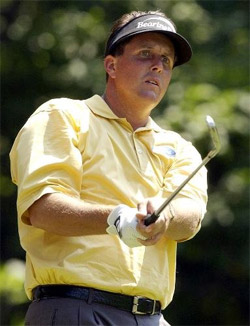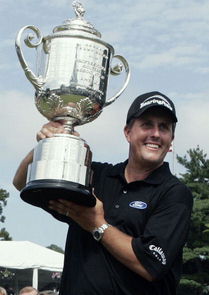 By the end of the 2003 PGA season Phil Mickelson was tired. Tired of facing the media and his own tortured soul over his lack of major championship victories. He was the poster child for underachievers and the unfortunate recipient of a clichéd label the media and masses had become accustomed to associating with all things Mickelson. He was “the best player to have never won a major.” He had been walking around with that pebble in his shoe for a long time and has finally shaken it out. Twice.
By the end of the 2003 PGA season Phil Mickelson was tired. Tired of facing the media and his own tortured soul over his lack of major championship victories. He was the poster child for underachievers and the unfortunate recipient of a clichéd label the media and masses had become accustomed to associating with all things Mickelson. He was “the best player to have never won a major.” He had been walking around with that pebble in his shoe for a long time and has finally shaken it out. Twice.
It is nearing the end of another season but this time Mickelson will be entering the off-season from an entirely different vantage point. No longer does he have to struggle to explain why he hasn’t been able to close a deal at the majors because he owns not one, but two major championships. Both of them came with what were golf’s equivalent to walk off home runs. Two seasons, two birdies on two final holes, and two majors in the bag. Phil Mickelson isn’t a one hit wonder.
We had become so used to Phil coming up just short of major victories that watching him win the big ones seemed a bit surreal. But, after all, Ben Hogan didn’t catch his major winning stride until he was in his middle thirties and Phil it seems is no different.
In 2002 he put his lack of majors in perspective. “To me, there are so many more things to enjoy in life. I love competitive golf. But I also love spending time with my family and a million other things. When you look at the big picture, golf is a game and it’s fun, but I don’t live for it. It’s really not like it’s a critical element.” Maybe that is what the press and some golf fans don’t understand about Mickelson. Maybe he doesn’t care that deeply. More likely he cares about the majors more than he lets on.
Mickelson is well known as a devoted family man. He keeps his wife Amy and three kids Amanda Brynn, Sophia Isabel, and Evan Samuel close bringing them with him to as many tournaments as he can manage.
In what was one of his high profile family moments, Phil wore a beeper to the 1999 U.S. Open and promised to leave the tournament should his wife go into labor with their first child. It was a nice gesture that some felt involved a little posturing for popularity. I’d have done the same thing if my wife was going into labor and I was “busy” with something else.
He and Amy had a brush with the unthinkable when Amy was giving birth to their son Evan when she suffered a severe tear in an artery. Thankfully, a specialist was close by and was able to save her from a life-threatening situation. It has been these kind of moments that have kept golf in perspective for Phil.
Mickelson’s good guy image is both his strength and his weakness. He is very popular with fans and spends a great deal of time signing autographs and interacting with the crowd both on and off the course. Such dedication causes many casual fans to love him for it. In the eyes of many he is an athlete to respect for his friendliness, sportsmanship, and family-first philosophy.
On course Phil is controlled. He deserves credit for not being a club thrower. He is steady whether he is making birdies or bogies. Some call it composure, some lack of desire, more likely his self-control saves him from further lost strokes.
He has come under criticism from some that he is warm to the fans but cool toward fellow competitors. Whether or not that is completely true only those closest to Phil can really know, but it makes for interesting conversation at the water cooler. Maybe his competitive fire prevents him from getting too close.
Prior to Mickelson’s 2004 Masters victory he had amassed nine top-five finishes at the majors and had come in second three times. Second to Payne Stewart at the 1999 U.S. Open, David Toms at the 2001 PGA Championship, and Tiger Woods at the 2002 U.S. Open. His lack of major victories stung and the questions made it worse until last year’s masters had us all breathing a collective sigh of relief.
Phil has had a solid 2005. By the time April rolled around he had victories at the FBR Open, AT&T Pebble Beach, and the BellSouth Classic. After cooling off in the middle to second half of the season he returned to the winners circle in last week’s PGA Championship.
 In 2000 Mickelson began a swing change with Rick Smith that ensured him greater consistency. “Because he was so gifted and successful he delayed making swing changes he probably should have made when he was young,” said Smith in 2000. “Because no matter how good your hands are, you don’t want to rely on them to square the club when it’s going 126 miles an hour under pressure.” Phil was seeking more stability in his swing so that he could swing with greater confidence when the pressure was greatest.
In 2000 Mickelson began a swing change with Rick Smith that ensured him greater consistency. “Because he was so gifted and successful he delayed making swing changes he probably should have made when he was young,” said Smith in 2000. “Because no matter how good your hands are, you don’t want to rely on them to square the club when it’s going 126 miles an hour under pressure.” Phil was seeking more stability in his swing so that he could swing with greater confidence when the pressure was greatest.
Mickelson’s short game coach, high profile instructor David Peltz, feels that Phil’s short game was masking some shortcomings. “As far as raw skill, Phil is the best I’ve seen. But Phil thinks of the short game as a way to save himself from disaster more than as a way to create scoring opportunities.” Their work together has paid off for Phil. His flop shot at the 18th hole that stopped within two feet to win the PGA Championship is a great example.
As far as putting goes Phil is one of the strongest putters on Tour. His aggressive approach to golf followed him to the dance floor as many of misses are on the high side of the cup and long. His stroke under pressure has not been tentative, but strong. Peltz encouraged him to focus on distance in such situations.
Mickelson favors tradition over technology in the putter department. He uses a simple blade putter that lacks many frills. It isn’t a forgiving cavity-back which is a testament to his skill as a putter. He is currently 15th in putting average on the PGA Tour so he’s a very good putter with the notable exception his five-putt from fifteen feet at the 2002 Players Championship. His putting average has increased slightly in 2005 to 1.742 from 1.717 in 2001 when he was second in putting average. His putting stroke is similar to the smooth stroke Ben Crenshaw employed.
Mickelson can reel off birdies with the best of them but his go-for-broke style prevented him from playing with the kind of consistency that delivers championships in the clutch. It was for this reason that Mickelson tweaked his approach slightly to improve his chances as scoring better prior to the 2004 season. The talk all throughout 2004 was about how he played more conservatively. It paid dividends as he missed the grand slam of golf by only a handful of strokes.
Mickelson’s biggest faux-pas (aside from his gambling problems) was his switch from Titleist to Callaway. After his his 2004 Master’s victory he tried to re-negotiate his contract with Titleist and they wouldn’t budge on their original agreement. They released him from the their fold with 16 months still left on his contract. He was picked up by Callaway for a deal worth $80 million over ten years. This didn’t fit his good guy persona too well.
 His green jacket fits him just right and his PGA Championship is well deserved, but we need time to get used to the new Phil. Mickelson, like Greg Norman, has weathered criticism for coming up short. Both have won a lot of tournaments, but failed to live up to the expectations. Phil has a new lease on his legacy with his majors. Only time will tell if he can capitalize again at a major.
His green jacket fits him just right and his PGA Championship is well deserved, but we need time to get used to the new Phil. Mickelson, like Greg Norman, has weathered criticism for coming up short. Both have won a lot of tournaments, but failed to live up to the expectations. Phil has a new lease on his legacy with his majors. Only time will tell if he can capitalize again at a major.
“I don’t think anything changed over the course of four or five days other than me gaining the experience of a lifetime,” Mickelson said on the heels of his Master’s victory. “I don’t look at my record any different. Some people do. That’s fine.”
Ben Crenshaw entered the World Golf Hall of Fame with two Masters and 19 PGA Tour victories so Mickelson has all put ensured himself a place among the best. Phil can now breathe a sigh of relief. He no longer has to spin the question, “Why can’t you win the big ones?” He’s won not one, but two majors and I have a feeling that winning more will come a lot easier.
Maybe now he won’t have to force a smile on the day they write the big checks because he has proved he can get the job in pressure situations.
One more thing: I think he should lose the visor permanently.
Tell Phil Mickelson, that he does a great job on getting out of sandtraps, but in the 2008 U.S. Open he is killing his chances of winning the Championship if he keeps using the Driver off the Tee It seems like about every hole he is in the Ruff Grass. He’s been told this before but it hasen’t sunk in yet. Maybe he could use a 3 Wood off the Tee to land in the Fairway but he has to do something. Monaghan MNS Univ of Oklahoma